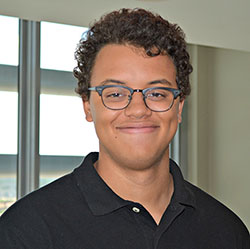News & Events
Student Spotlight – Taylor Thorns, Economics
Summer training program shows student what it takes to get a Ph.D. in economics

Of the 51,008 doctorates awarded in 2012 the United States, 1,195, or 2.3 percent, were awarded in economics, according to the U.S. Survey of Earned Doctorates.
Of that small percentage, only 15 economics doctorates were awarded to Blacks and African-Americans. That’s 1.3 percent of economics doctorates and 0.03 percent of all doctorates awarded that year – and the smallest amount of doctorates awarded to a racial group according to the survey.
Those numbers could serve as a discouragement to African Americans interested in a career in academia as an economist, but economics major Taylor Thorns is determined to not feel daunted by the statistics.
This summer, Thorns was one of 21 students selected to attend the American Economic Association Summer 2014 Training Program. Launched in 1974, the program is a six-week intensive curriculum designed to help talented undergraduate students learn skills and conduct research in economics in preparation for studies at the doctoral level.
According to the AEA website, “the program is open to all qualified students, regardless of race, ethnicity, or gender. Primary consideration for acceptance into this program will be given to rising sophomores and juniors planning on pursuing a Ph.D. in economics. The Minority Fellowships to attend the program are open to qualified U.S. citizens and permanent residents, with a preference for those who are members of historically disadvantaged racial or ethnic minority groups and who advance the diversity of the economics profession.”
The AEA summer program may directly account for 17-21 percent of the PhDs awarded to minorities in economics over the past 20 years, according to a recent study published by the National Bureau of Economic Research.
By applying, being accepted and participating in program, Thorns took a major step toward realizing his career goals and changing the landscape for African-American economic Ph.Ds.
He received full funding to participate in the program, which included a $10,000 scholarship to cover living and dining expenses, a $3,000 stipend for travel and baggage fees, and funding for a few fun, outdoor trips to tour the Albuquerque area. In addition, he will receive a travel grant to attend the 2015 AEA Annual Meeting in Boston this January.
Thorns learned about the program from Dr. Natalia Zhivan, clinical assistant professor of economics.
“In my classes, I like to provide information about different opportunities for undergraduate students, such as fellowships, scholarships, internships, etc. and encourage everyone to apply,” she said. “Taylor was taking one of my classes, ‘Introduction to Econometrics’ last spring and he took the initiative to apply into this summer program by himself. I was very delighted to find out that he was accepted.”
During the six-week experience at the University of New Mexico, Thorns and his cohort took three classes - Microeconomics, Econometrics, and Math for Economists. They spent a lot of time strengthening their math skills, which is necessary for economics study at a doctoral level.
“Many of the concepts we learned this summer showed up again by the first day of classes back at UH, and I don’t except them to become any less relevant any time soon,” Thorns said.
Thorns also helped to design and implement a team research project. The students participated in workshops that taught them how to put together their curriculum vitas and other graduate school application materials. They learned from guest lecturers, had dinners with professional and academic economists and forged mentoring relationships with AEA leaders and faculty.
Once he returned to Houston Thorns told Dr. Zhivan about his summer experience.
“I can tell that this program had a big influence in his vision of his future career path,” said Dr. Zhivan. “He is currently taking one of my classes this semester and Taylor is doing really well. His work in class shows that he has much deeper understanding and appreciation of the economic principles. And he is interested in pursuing a graduate degree in Economics. I hope that his experience will inspire other students to apply.”
Thorns expects to graduate with a bachelor’s degree in Economics in 2016.
“I felt like the program provided a very wide understanding of academia and the PhD process as a whole,” Thorns said. “My experience as a part of the program was great and one of the most important of my academic career.”
- By Monica Byars